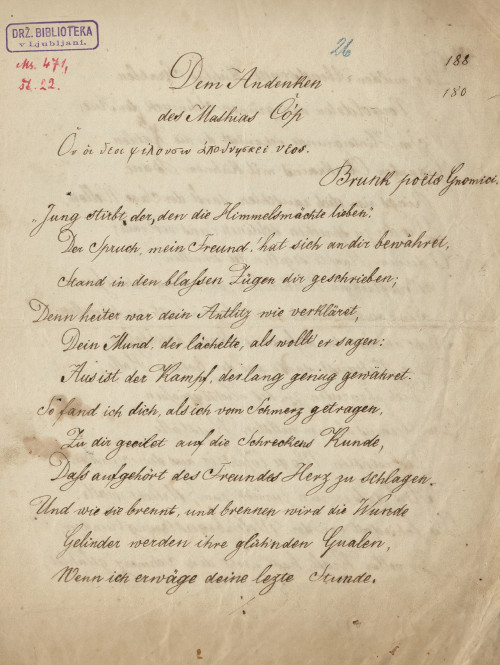France Prešeren and Slovenian Romantik
Despite all obstacles, writers always found a way to those who needed their words. Regardless of all the geographical barriers that separated their homelands, the humanists knew each other. It was a similar story with the Romantics.
Prešeren's opus and his written legacy reveal his knowledge of the works of many literary models, which were the yardstick for the value of his own work. A considerable contribution to the expansion of his literary horizons was made by Matija Čop, a former university lecturer in Lviv who had taken over the management of the Lyceum Library in Ljubljana. Čop's sudden death in July 1835 took a great toll on Prešeren: He immediately dedicated an elegy in German to his deceased friend, in which he also expressed his worldview influenced by Schelling's philosophy, and then also Krst pri Savici (The Baptism on the Savica), his "Narrative in Verse" published in April 1836. Prešeren did not attempt to create an epic, but resorted to the form of narrative poetry, which had become current with Byron and also left much room for lyrical inspiration.
Prešeren knew the Czech Romantic poet Karel Hynek Mácha personally, and he paid tribute to Adam Mickiewicz, the most important author of Polish Romanticism, by translating some of his verses into German. In one of his sonnets - he left it in both Slovenian and German versions - Prešeren compared his suffering to that described by Friedrich Schiller in the well-known ballad about the knight Toggenburg.
Of course, not everyone had affection for Prešeren. The leading Slovenian linguist Jernej Kopitar, who had himself celebrated in the wider world as the patriarch of Slavic studies, was extremely unhappy with his verse. He did not appreciate the poetry of his compatriots, which followed European currents such as Romanticism; he believed that one's own literature should be developed on the basis of folk tradition. Therefore, as a censor, he hindered Prešeren's work, and the poet, in turn, rejected him with a series of drastically critical and mischievous verses in German and Slovenian.
Kopitar's opposition did not harm Prešeren's reputation; on the contrary, the poet's death saddened many. One of the central German-Austrian poets of the Vormärz period, Anastasius Grün, with whom Prešeren had been a friend since his younger years, dedicated an obituary to him in 1849, but he was unable to publish it anywhere for a long time at that time, when the impulses of the revolution were drying up.
